| 7 January |
• yesterday • tomorrow |
| Optional Memorial of Saint Raymond of Penyafort, Priest |
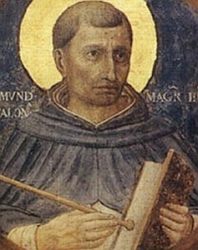
• Raymond of Rochefort
• Raymond of Pegnafort
• Raymond of Pennafort
• Raymond of Peñafort
• Raimund, Raymund, Raimundus
Born to the Aragonian nobility. Educated at the cathedral school in Barcelona, Spain. Philosophy teacher around age 20. Priest. Graduated law school in Bologna, Italy. Joined the Dominicans in 1218. Summoned to Rome, Italy in 1230 by Pope Gregory IX. Assigned to collect all official letters of the popes since 1150. Raymond gathered and published five volumes, and helped write Church law.
Chosen master general of the Dominicans in 1238. Reviewed the Order's Rule, made sure everything was legally correct, then resigned his position in 1240 to dedicate himself to parish work. He was offered and archbishopric, but he declined, instead returning to Spain and the parish work he loved. His compassion helped many people return to God through Reconciliation.
During his years in Rome, Raymond heard of the difficulties missionaries faced trying to reach non-Christians of Northern Africa and Spain. Raymond started a school to teach the language and culture of the people to be evangelized. With Saint Thomas Aquinas, he wrote a booklet to explain the truths of faith in a way that non-believers could understand. His great influence on Church law led to his patronage of lawyers.
1175 at Peñafort, Catalonia, Spain
6 January 1275 at Barcelona, Spain of natural causes
29 April 1601 by Pope Clement VIII
• attornies, barristers, lawyers
• canonists
• medical record librarians
• Barcelona, Spain
• Navarre, Spain
Summa Cassuam
• book
• cloak
• key
• Dominican using his cloak as a sail
Look then on Jesus, the author and preserver of faith: in complete sinlessness he suffered, and at the hands of those who were his own, and was numbered among the wicked. As you drink the cup of the Lord Jesus (how glorious it is!), give thanks to the Lord, the giver of all blessings. May the God of love and peace set your hearts at rest and speed you on your journey; may he meanwhile shelter you from disturbance by others in the hidden recesses of his love, until he brings you at last into that place of complete plenitude where you will repose for ever in the vision of peace, in the security of trust, and in the restful enjoyment of his riches. - from a letter by Saint Raymond
https://catholicsaints.info/saint-raymond-of-penyafort/
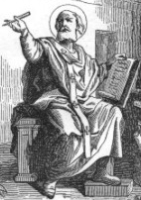
• Lucian of Drepana
• Lucian of Nicomedië
• Lucian of Nicomedia
• Lucian the Martyr
• Lucian of Samosata
• Lucianus...
15 October (Eastern Church)
Following the death of his wealthy parents, Lucian gave away his possessions, and studied rhetoric, philosophy, and Scripture under Macarius at Edessa. Lived as a hermit briefly in his youth. Ordained in Antioch. Spiritual director of Saint Pelagia of Antioch.
Head of a school of theology in Antioch; one of his students was Arius, founder of Arianism. Friend of Paul of Samosata and other heretics, and may have been excommunicated himself at one point, but later came back to full communion with the Church.
Noted Scripture scholar, working to insure that copyists made the most exact copies possible, correcting copyist errors by comparing against older texts in the original languages. His edition of the complete Bible, known as the Lucian Recension was used by many churches, and by Saint Jerome during his work on the Vulgate.
Arrested in Nicomedia during the persecutions of Diocletian, and spent nine years in prison. Dragged before the emperor as an example, he struggled to his feet and gave a great defense of the faith. He thrown back in the cells, given no food or water for 14 days, then hauled before the tribunal and interrogated; he answered all questions with "I am a Christian." Martyr.
mid-3rd century at Samosata, Syria
• tortured, starved, and run through with a sword in 312 at Nicomedia, Bithynia (modern Izmid, Turkey)
• buried at Drepanum (later renamed Helenopolis)
• imprisoned priest lying on potsherds and consecrating the Eucharist on his own breast
• with a chalice and Host, in allusion to his offering the holy Sacrifice in prison
• with a dolphin at his side
https://catholicsaints.info/saint-lucian-of-antioch/
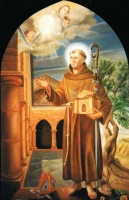
Matthew Guimerà
Matthew was a Franciscan friar, joining the Order in 1391 at the convent of Saint Francis of Assisi in Agrigento, Italy; he made his profession in 1394. He studied theology in Bologna, Italy and Barcelona, Spain where he earned a degree and was ordained a priest in 1400. Travelling preacher in the region of Tarragona, Spain from 1400 to 1405. Master of novices at the Saint Anthony convent in Padua, Italy from 1405 to 1416. In 1417 he met and began to work with Saint Bernardine of Siena. Founded monasteries in Italy and Spain. Franciscan provincial vicar from 1425 to 1430. Commissioner General of Sicily from 1432 to 1440.
Chosen bishop of Agrigento by Pope Eugene IV on 17 September 1442. Bishop Matthew was a reformer, revitalizing the clergy, ending abuse, restoring clerical discipline, and prohibiting simony. This created many opponents in the clergy; when Matthew began distributing larger amount of charity to the poor, his enemies accused him of squandering the wealth of the Church, and when Vatican officials began investigating him, they included accusations of having an affair with a local woman. He was found innocent of all charges, but he decided that he could do more good for the faith outside the bishopric, and resigned his see in 1445 and returned to preaching, supporting monastic houses, and spreading devotion to the Holy Name of Jesus.
1377 on the Via Arco di San Francesco di Paola in Rabbato, Agrigento, Italy
• 7 January 1450 in the Franciscan monastery of Santa Maria di Gesù, Palermo, Sicily (in modern Italy) of natural causes
• buried at the Santa Maria di Gesù monastery
• miracles reported at the grave
21 February 1767 by Pope Clement XIII (cultus confirmation)
https://catholicsaints.info/blessed-matthew-of-agrigento/
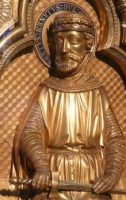
• Canute Laward
• Canute of Schleswig
• Canute the Lord
• Duke of Jutland
• King of the Western Wends
• Knud Lavard
• Knut Lavard
25 July in Denmark for the translation of his relics
Second son of King Eric the Good of Denmark. Nephew of King Saint Canute of Denmark. Raised in the court of Saxony. Duke of Jutland with his court at Schlewig. Spent years defending against Viking raids. Supported the missionary work of Saint Vicelin. Father of King Valdemar I, who worked for Canute's canonization. King of the Western Wends in 1129. Canute's uncle, King Nils of Denmark, opposed Canute coming to the throne, and arranged his murder. Venerated in Denmark.
c.1096 at Roskilde, Denmark
• murdered in 1131 by his cousins Magnus Nielsen and Henry Skadelaar in the forest of Haraldsted near Ringsted in Zeeland, Denmark
• declared a martyr for justice
• relics enshrined at Ringsted on 25 June 1170
1169 by Pope Alexander III
Zeeland, Denmark
knight with a wreath, lance, and ciborium
https://catholicsaints.info/saint-canute-lavard/
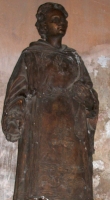
• Giuliano of Orta
• Julian, Julianus, Julien
Younger brother of Saint Julius of Novara with whom he studied in Athens, Greece. When Julius was ordained a priest, Giuliano was ordained a deacon so he could serve his brother’s ministry. The two worked to build churches and teach orthodox Christianity in the areas of modern Hungary, Bohemia and Poland in the wake of the Arian heresy. At the ascension of Emperor Theodosius I, the brothers obtained permission and support to become travelling preachers throughout the Roman Empire. Worked with Saint Ambrose of Milan. When Giuliano arrived in Gozzano, Italy on Lake Maggiore, he fell in love with the area and settled there, preaching and converting the people. He built a church of Santa Maria, which later was re-dedicated to San Lorenzo.
c.350 in Aegina, Greece
• 391 in Gozzano, Italy of natural causes
• buried in the church of Santa Maria that he had built in Gozzano
• relics enshrined in the basilica of Gozzano in 1691
Gozzano, Italy
https://catholicsaints.info/saint-giuliano-of-gozzano/
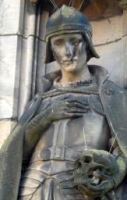
• Reinhold of Koln
• Reinhold of Dortmund
• Rainald, Reinold, Reinout, Reynold, Rinaldo, Rinold
Relative of Charlemagne. Benedictine monk. Supervised building operations at Saint Pantaleon abbey, Cologne, Germany. Murdered by the construction workers; Reinhold worked harder than they did and made them look bad.
• beaten to death with hammers by stone masons in 960 at Cologne, Germany
• body thrown in the Rhine River
• body later found through divine revelation
• relics transferred to the church of Saint Rheinold in Dortmund, Germany in 1059
• some relics transferred to Cologne, Germany
• some relics transferred to Toledo, Spain in 1616
• against plague
• sculptors
• stone masons
• stonecutters
• Dortmund, Germany
• monk with a stone mason's hammer
• monk being killed by the stone masons
• dead monk being thrown into water
• knight holding a hammer
https://catholicsaints.info/saint-reinhold-of-cologne/
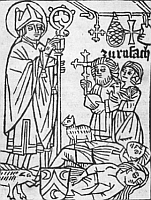
• Valentine of Mais • Valentine of Raetia • Valentine of Ratien • Valentine of Retie • Valentine of Rezia • Valentine of Rhaetia • Valentine of Rhétie • Valentin, Valentinus
4 August (translation of relics)
Monk. Abbot. Missionary bishop in Rhaetia, Switzerland, an area in the border region of modern Italy, Austria and Switzerland. Late in life he withdrew to live as a hermit near Mais, Austria.
• 7 January 475 at Mais, Tyrol, Austria of natural causes
• re-interred at Trent, Italy in 739
• relics transferred to the Cathedral of Saint Stephen in Passau, Germany in 764
• against convulsions
• against cramps
• against epilepsy
• against gout
• against plague
• cattle
• epileptics
• pilgrims
• poor people
• Passau, Germany, city of
• Passau, Germany, diocese of
bishop preaching to pagans
https://catholicsaints.info/saint-valentine-of-passau/
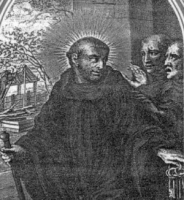
• Tillo of Westphalia
• Tillo of Izegem
• Filman, Hillo, Hilloin, Hillonius, Hilonius, Theau, Théau, Thielemann, Thielman, Thillo, Tillmann, Tilloine, Tillon, Tillone, Tilman, Tilmannus
Kidnapped by raiders and brought to the Low Countries as a slave. Ransomed by Saint Eligius of Noyon. Benedictine monk at Solignac, France. Priest. Missionary in the regions around Courtrai, France. Eventually retired to become a hermit at Solignac.
c.610 in Saxony (in modern Germany)
• 702 at Solignac, France of natural causes
• relics destroyed by Huguenots
• against fever
• against childhood diseases
• children learning to walk
• Gits, Belgium
• Izegem, Belgium
abbot holding a chalice and staff
https://catholicsaints.info/saint-tillo-of-solignac/

• Giovanna Haze
• Jeanne Haze
• Johanna Haze
• Marie-Thérèse of the Sacred Heart of Jesus
One of seven children born to the secretary of the last prince-bishop of Liège, Belgium. Could read and write by the age of four. She was drawn to religion from an early age, but was 50 years old when she finally found her vocation. Founded the Congregation of the Daughters of the Cross of Liège in 1833, and served as its Superior General until her death; at that point, the Congregation had more than 50 houses and more than 900 sisters in service to the weak and poor.
27 February 1782 in Liège, Belgium as Jeanne
7 January 1876 in Liège, Belgium of natural causes
21 April 1991 by Pope John Paul II
https://catholicsaints.info/blessed-marie-therese-haze/
Aldericus, Aldricus, Audry, Elric
Grew up at Aachen, Germany, serving in the court of Charlemagne. Left court life at age 21 to study for the priesthood at Metz, France. After ordination he served for nine years as chaplain in the court of Charlemagne's son Louis the Pious. Bishop of LeMans, France in 832. Known for his personal sanctity, his execellent adminstrative skills, and for his work for his parishioners. When Louis died, Aldric supported Charles the Bald for the throne; this resulted in Aldic being exiled from Le Mans. He was reinstated to his see by Pope Gregory IV. Papal legate to King Pepin of Aquitaine, France. Aldic convinced Pepin to return Church property stolen by the throne. Took part in the Council of Paris and Council of Tours. Paralyzed for the last two years of his life. Some of his writings survive today.
21 June 800
24 March 857 at Le Mans, France of natural causes
https://catholicsaints.info/saint-aldric-of-le-mans/
• Ambrogio Fernandez
• Ambrósio Fernandes
6 February
Soldier in the Portuguese army. Worked as a trader and security guard for other traders in Japan beginning in 1571. He had a conversion experience, and entered the Jesuits as a lay brother in 1579 to assist their evangelization of Japan including acting as an interpreter. When Christian missionaries were exiled from Japan in 1614, Brother Ambrose stayed to help minister to covert Christians, working with Blessed Charles Spinola. When captured by authorities, he and some others were dragged to prison in Nagasaki and kept in a cage with no protection from the weather for 13 months until he died. Martyr.
1551 at Sisto, Portugal
in 1620 from a stroke caused by abusive conditions in Suzota prison, Omura, Japan
7 May 1867 by Pope Pius IX
https://catholicsaints.info/blessed-ambrose-fernandez/
Pilgrim to Rome, Venice, Pugulia and Mount Gargano in Italy, Compostella in Spain, and the Holy Lands. Camaldolese hermit. Beginning on 6 January 1156, he became a spiritual student of Blessed William of Maleval and lived an extremely ascetic life; he ate little, slept on the ground, and when he felt tempted, would roll in a pile of nettles. Miracle worker. He later wrote a biography of Blessed William, buried him after his passing, and built a small church and group of hermit cells over the grave.
Monte-alceto, Siena, Tuscany, Italy
c.1181 of natural causes
man with a rabbit in or on his sleeve, a reference to an incident in which a rabbit ran to him for protection from hunters
https://catholicsaints.info/blessed-albert-of-siena/

• Wittikund of Saxony
• Widukind, Wittekind
Raised a pagan. Duke of Westphalia (in modern Germany). When Communion was given to Christian soldiers on Christmas night, he had a vision of the Christ Child. He converted to Christianity, was sponsored into the Church by Charlemagne, and baptized in 785.
• c.804 in Enger, Germany
• relics transferred to Paderborn, Germany
https://catholicsaints.info/blessed-wittikund-of-westphalia/
Polieuto, Polyeuktos, Polyeuctes, Polyeuktos
Officer in the Roman legion. Convert. In his zeal as a new convert, he tore up the Valerian's imperial orders to persecute Christians, then smashed idols being carried in pagan procession. Tortured and martyred.
His story was well known to the ancients who built several churches with his name, including a huge one in Constantinople in which it was customary to swear legal oaths. His Acts were widely read, and formed the basis for theatrical tragedy.
beheaded in 250 at Melitene, Armenia (modern Malatya, Turkey)
https://catholicsaints.info/saint-polyeuctus-of-melitene/

Giuseppe, Joseph
24 November as one of the Martyrs of Vietnam
Married layman, a father, a family man and a farmer. In the persecutions of Tu Duc, Guise was ordered to trample on a cross to prove he was not a Christian. Instead, he knelt before the cross and began praying. Martyr.
c.1825 in Nam Dien, Vietnam
beheaded on 7 January 1862 in An Bai, Tonkin (in modern Vietnam)
19 June 1988 by Pope John Paul II
https://catholicsaints.info/saint-giuse-tuan-7-january/
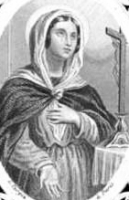
• Virginia of Poitiers
• Virginia of Thonars
• Virginia of Tonars
• Sigrid, Verge, Vierge, Virgana
Shepherdess in the area of Poitou, France.
• Deux-Sèvres, Poitou, France
• relics transferred to the church of Saint Vicent in Metz, France
• relics destroyed in 1793 during the anti-Church excesses of the French Revolution
• against fever
• Sainte-Verge, France
https://catholicsaints.info/saint-virginia-of-ste-verge/
Joined the Premonstratensians in 1561 in the Averbode monastery near Diest, Brabant, Belgium. Ordained a priest and chosen Vicar of Rumen, Belgium in 1570. Fleeing ahead of Protestants forces, he moved to Sint-Truiden, Limburg, Belgium where he applied himself to parish work, but when a Protestant army overran the area he was captured and executed. Martyr.
c.1539 in Hoeleden, Brabant, Flanders (in modern Belgium)
1579 in Sint-Truiden, Limburg, Flanders (in modern Belgium)
https://catholicsaints.info/blessed-engelbert-beets/
• Caentigern
• Kentigerna of Loch Lomand
• Quentigerna
Daughter of Prince Kelly of Leinster, and Saint Coellen. Sister of Saint Comghan. Married lay woman. Mother of Saint Fillan. When her bother Comghan had to flee the country due to opposition to his dedication to the faith, Kentigerna fled to Scotland. Widow. Anchoress on Inchebroida Island in Loch Lomond where there still stands a church in her name.
Ireland
c.734 on Inch Cailleach, Scotland
https://catholicsaints.info/saint-kentigerna/
Ciro, Cyr, Kyros
Monk in Amasra and Paflagonia. Bishop and patriarch of Constantinople, c.705. He helped prevent the new emperor from exacting some of the revenge against his political opponents. Deposed from his see in 712 when Emperor Filippico took the Byzantine throne, he spent his final years as a monk at the Chora Abbey in Constantinpople.
714 in Constantinople (modern Istanbul, Turkey) of natural causes
https://catholicsaints.info/saint-cyrus-of-constantinople/
Cwyllog, Cywellog
Born a princess, the daughter of Saint Caw, King of Arecluta, a district on the River Clyde in Scotland. When Caw was turned out of his kingdom by the Picts, he and his family fled to Twr Celyn in Anglesey, Wales. Cywyllog founded the church in Llangwyllog, Wales. Legend says that she married Mordred, King Arthur’s traitorous nephew. Widowed, Cywllog retired from the world to live as a nun in the latter 6th century.
https://catholicsaints.info/saint-cywyllog-ferch-caw/
A Christian living in Muslim controlled Smyrna in Turkey, he one day stated “There is no God but God.” Some Muslims heard this, decided that this was an official conversion to Islam, and demanded that Athanasius formally renounce Christianity. When he refused, Athanasius was accused of apostasy for leaving Islam after his conversion, and sentenced to be executed. Martyr.
beheaded in 1700 in Smyrna (in modern Turkey)
https://catholicsaints.info/blessed-athanasius-of-attalia/
Francis
20 September as one of the Martyrs of Korea
Layman martyr in the apostolic vicariate of Korea.
c.1745 in Dangjin, Chungcheong-do, South Korea
7 January 1800 in Cheongju, Chungcheong-do, South Korea
15 August 2014 by Pope Francis
https://catholicsaints.info/blessed-franciscus-bae-gwan-gyeom/
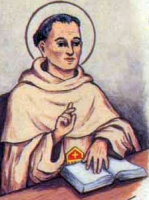
Member of the Mercedarians. Noted teacher and scholar, he knew Latin, Greek, Arabic, Hebrew and Chaldean, taught theology and the Bible, wrote commentaries and poetry.
at the Mercedarian monastery of Santa Eulalia in Murcia, Spain of natural causes
https://catholicsaints.info/blessed-leandro/
Anastasius XVIII
Archbishop of Sens, France from 968 to 977. Started construction on the cathedral there. Great supporter of the monks of Saint-Pierre-le-Vin.
• 977 in Sens, France of natural causes
• relics in the monastic church of Saint-Pierre-le-Vin
https://catholicsaints.info/saint-anastasius-of-sens/
Valentine
Bishop of Terni, Italy in 494, consecrated by Pope Gelasius I; he served from 39 years.
• 533 in Interamna (modern Terni), Italy
• buried at the church of San Zeno, Rocca San Zeno, Terni
https://catholicsaints.info/saint-valentin-ii-of-terni/
• Emilian of Combes
• Aemilio, Aemilianus
Benedictine monk at Saujon, France. Hermit in the forest of Combes, Bordeaux, France. A well-known wine is named for him.
at Vannes, France
767
https://catholicsaints.info/saint-emilian-of-saujon/
Theodor
Monk. Spiritual student of Saint Ammonius the Great in Egypt. One of the early desert hermits on the Nile. Mentioned in the writings of Saint Athanasius of Alexandria and Saint Gregory the Great.
4th century
https://catholicsaints.info/saint-theodore-of-egypt/
Barnoc, Brannoc, Brannocus
Monk. Migrated to Devon, England. Founded a monastery at Braunton in Devonshire, and served as its first abbot.
6th century Welsh
buried at the monastery he founded at Braunton, Devonshire, England
https://catholicsaints.info/saint-brannock/
Bilicerius, Lucerius, Licerius, Lycerius
Deacon. Repeatedly tortured to give up his faith before being executed. Martyr.
Syrian
300 at Antioch, (in modern Turkey)
https://catholicsaints.info/saint-clerus-of-antioch/
Believed to have been a count. Martyr.
• martyred, date unknown
• relics discovered at Cagliari, Sardinia in 1615, and are enshrined there today
https://catholicsaints.info/saint-julian-of-cagliari/
Fifth century bishop of Pavia, Lombardy, Italy. Supported the acts of the Council of Milan.
465 in Pavia, Italy of natural causes
https://catholicsaints.info/saint-crispin-ii-of-pavia/
Martyr.
• 125 in Brescia, Italy
• his relics were re-discovered in 1529
https://catholicsaints.info/saint-benjamin-of-brescia/
Martyr.
• 125 in Brescia, Italy
• his relics were re-discovered in 1529
https://catholicsaints.info/saint-maximus-of-brescia/
Bishop of Aendrum, County Down, Ireland. Involved in the 640 controversy about the proper dating of Easter.
7th century
https://catholicsaints.info/saint-cronan-beg/
Bishop of Verona, Italy; records of his service vary from the late 3rd to the early 4th century.
https://catholicsaints.info/saint-senator-of-verona/
Third century bishop of Pavia, Lombardy, Italy for 35 years.
c.250
https://catholicsaints.info/saint-crispin-i-of-pavia/
Martyred at Heraclea.
https://catholicsaints.info/saint-januarius-of-heraclea/
Martyr. No other information has survived.
https://catholicsaints.info/saint-candida-7-january/
Martyr.
https://catholicsaints.info/saint-spolicostus-of-greece/
Martyred at Heraclea.
https://catholicsaints.info/saint-felix-of-heraclea/
Martyr. No other information has survived.
https://catholicsaints.info/saint-polyanthus/
Martyr.
https://catholicsaints.info/saint-candida-of-greece/
Martyr.
https://catholicsaints.info/saint-pallada-of-greece/
Twelfth century Camaldolese hermit.
https://catholicsaints.info/blessed-anselmo/
Martyr. No other information has survived.
https://catholicsaints.info/saint-phylo/
• Return from Egypt
CatholicSaints.Info Portable Edition